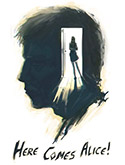
 Review Fix chats with playwright Mark Schofield who discusses his production at the Midtown International Theatre Festival, “Here Comes Alice!†Breaking down the inspiration for the performance, as well as his goals for the future, Schofield lets us know exactly why we should check out the production.
Review Fix chats with playwright Mark Schofield who discusses his production at the Midtown International Theatre Festival, “Here Comes Alice!†Breaking down the inspiration for the performance, as well as his goals for the future, Schofield lets us know exactly why we should check out the production.
For more information on the production and the MITF, click here.
Review Fix: What was the inspiration for the production?
Schofield: I find it very compelling to think about ways in which the internal pressures we all deal with are possibly greater than the external ones. To that end, I found myself dwelling on the central conceit to Here Comes Alice!, which is that hangin’ judge in your mind is the one who’s going to find you guilty of whatever you worry you might be guilty of, whether you are or not. It’s the sort of idea I can and do spend lots of time considering, and I think it’s highly relatable.
Review Fix: What’s your creative process like?
Schofield: I catch it when it comes. I develop a scene or a series of scenes for as long as that impulse is flowing; then I pick up a guitar and fool around with a song; then I read 3 different books for a week. I don’t force any creative development. I take it the way it arrives. If I force it, it’s no good, and then I just have to erase it anyhow.
Review Fix: What makes you different from other playwrights?
Schofield: They don’t have my experiences and I don’t have theirs. I feel like no one else could have written this play. I feel like anyone’s creative output is a direct result of a big old random stew of influences, experiences, ideas and personality that are unique to each person.
Review Fix: What makes this production special?
Schofield: It contains characterization shown in a way that I don’t think has been seen before. I certainly have seen anything like it. Some people will have the play’s reality dawn on them as it develops. Others will understand it when they’re home later that night or the next day. They’ll connect the dots and see why something so unreal felt so real.
Review Fix: How is your cast unique?
Schofield: They bring their own insights and impulses to the characters, which there’s plenty of space in the writing for them to do. It’s somewhat like jazz. The story is more fluid and less rigid, so the cast is able to ground the characters in whatever’s unique about themselves.
Review Fix: What did you learn about yourself through this process?
Schofield: The biggest thing I learned was about the way you can make things happen when you step back and relinquish a little control. As a solo writer and a solo musician, I tend to know exactly what I want and exactly how to execute it. In collaborating with a cast and production team, you see that the initial create idea can grow in healthy ways beyond what you conceived, if you’re open and recognize the possibilities.
Review Fix: How does it feel to be part of this festival?
Schofield: It’s absolutely an honor. The festival’s acceptance of my play made me feel very good about myself and the work. So I feel a debt of gratitude that I’d like to repay. And I’m delighted to be involved with so many other talented people.
Review Fix: What are your goals for the production?
Schofield: I’d like the production to seize hold of viewers’ attention from the outset, which I believe it will, and raise questions about how they see their own lives, inviting them to, knowingly or not, embrace the surreal as a tool to see reality the more clearly. I find the ideas in this play helpful and I hope others will too.
Review Fix: Who do you think will enjoy it most?
Schofield: Here Comes Alice! is best enjoyed by those who like laughing, who value strangeness and appreciate it as a mirror to our lives, and anyone who has come out of a relationship wondering what the hell just happened.
Review Fix: What’s next?
Schofield: I want to provide Here Comes Alice! a longer, fuller life after the festival. I’ll do my best to make that happen. I’m also at work on a full-length political/personal play that features an idea that has never been seen before.


Leave a Reply